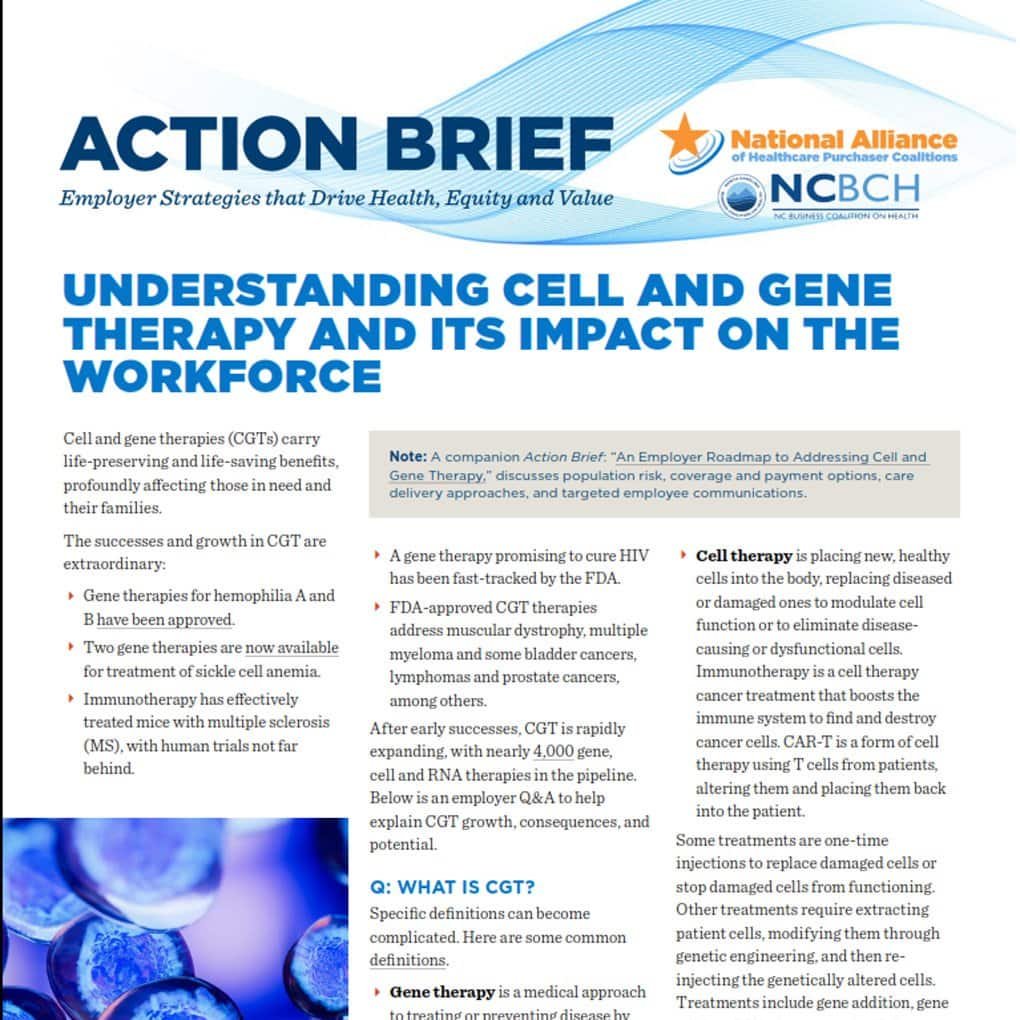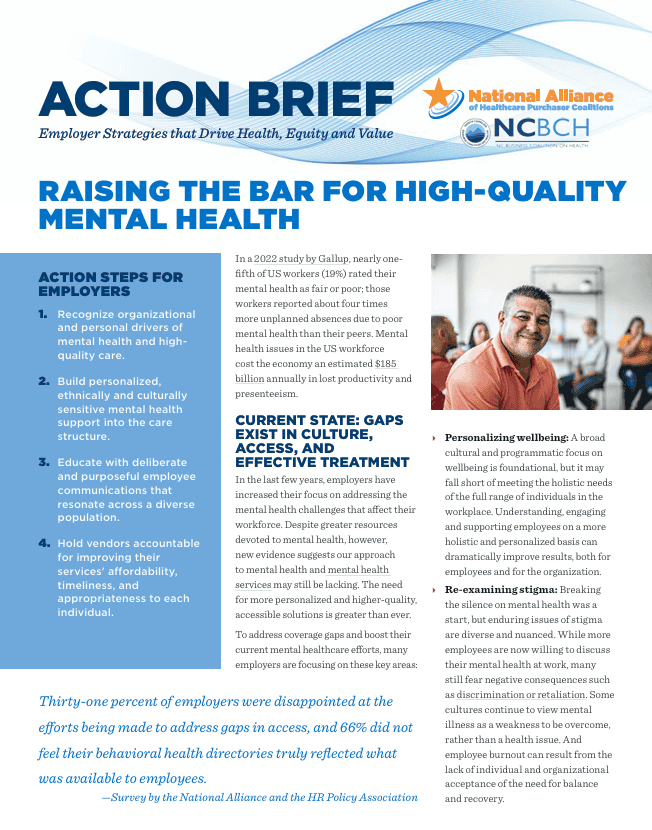Action Briefs and Resources
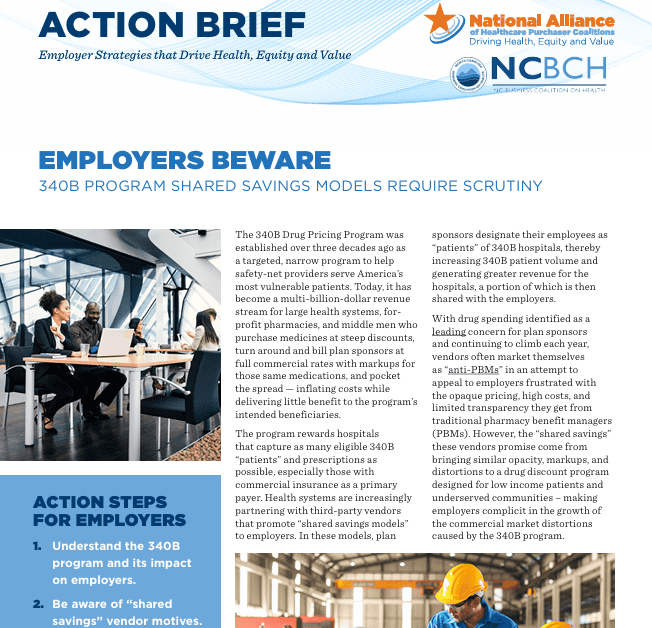
Employers Beware: 340B Program Share Savings Models Require Scrutiny
The 340B Drug Pricing Program was established over three decades ago as a targeted, narrow program to help safety-net providers serve America’s most vulnerable patients. Today, it has become a multi-billion-dollar revenue stream for large health systems, for- profit pharmacies, and middle men who purchase medicines at steep discounts, turn around and bill plan sponsors at full commercial rates with markups for those same medications, and pocket the spread — inflating costs while delivering little benefit to the program’s intended beneficiar

An Employer Roadmap to Addressing Cell and Gene Therapies
Cell and gene therapies (CGTs) carry life-preserving and life-saving benefits, profoundly affecting those in need and their families. This Action Brief discusses population risk, coverage and payment options, care delivery approaches, and targeted employee communications.

Hypertension Control: A Vital Business Investment
High blood pressure, also known as hypertension, is the most common health condition confronting 48% of US adults. Even though the US workforce is younger on average than the overall adult population, 3 in 10 employees have hypertension, affecting more workers than other health conditions such as diabetes or depression.
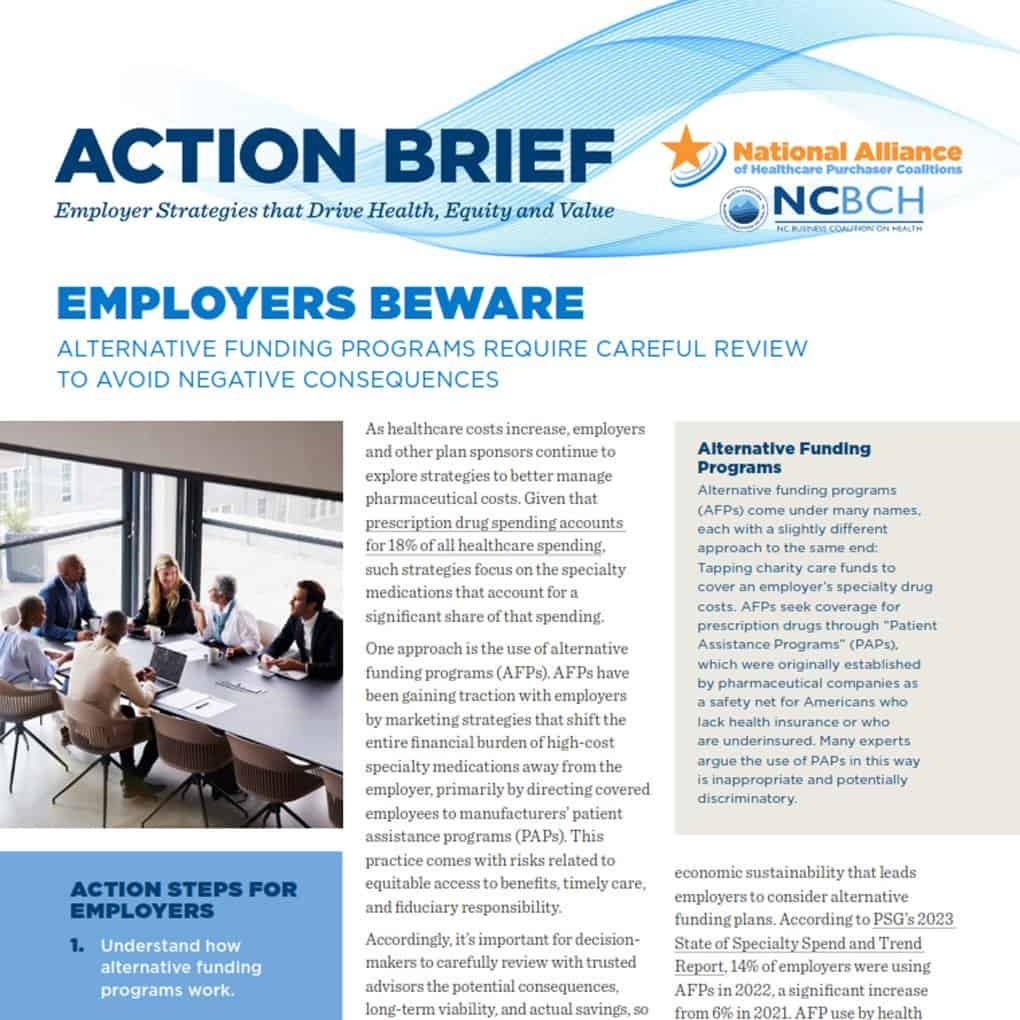
Employers Beware: Alternative Funding Programs Require Careful Review to Avoid Negative Consequences
As healthcare costs increase, employers and other plan sponsors continue to explore strategies to better manage pharmaceutical costs. Given that prescription drug spending accounts for 18% of all healthcare spending, such strategies focus on the specialty medications that account for a significant share of that spending. One approach is the use of alternative funding programs (AFPs). AFPs have been gaining traction with employers by marketing strategies that shift the entire financial burden of high-cost specialty medications away from the employer, primarily by directing covered employees to manufacturers’ patient assistance programs (PAPs). This practice comes with risks.

U.S. Business Action to End HIV and Advance Health Equity
The private sector is bringing new expertise and momentum to an effort once thought impossible—the end of the HIV epidemic in the U.S. It’s going to take leaders across business and industry to get there. Employers and other plan sponsors working together can change the trajectory of HIV in the U.S. by leveraging their reach and influence. This Action Brief provides actionable steps for understanding HIV/AIDS and vanquishing new infections.
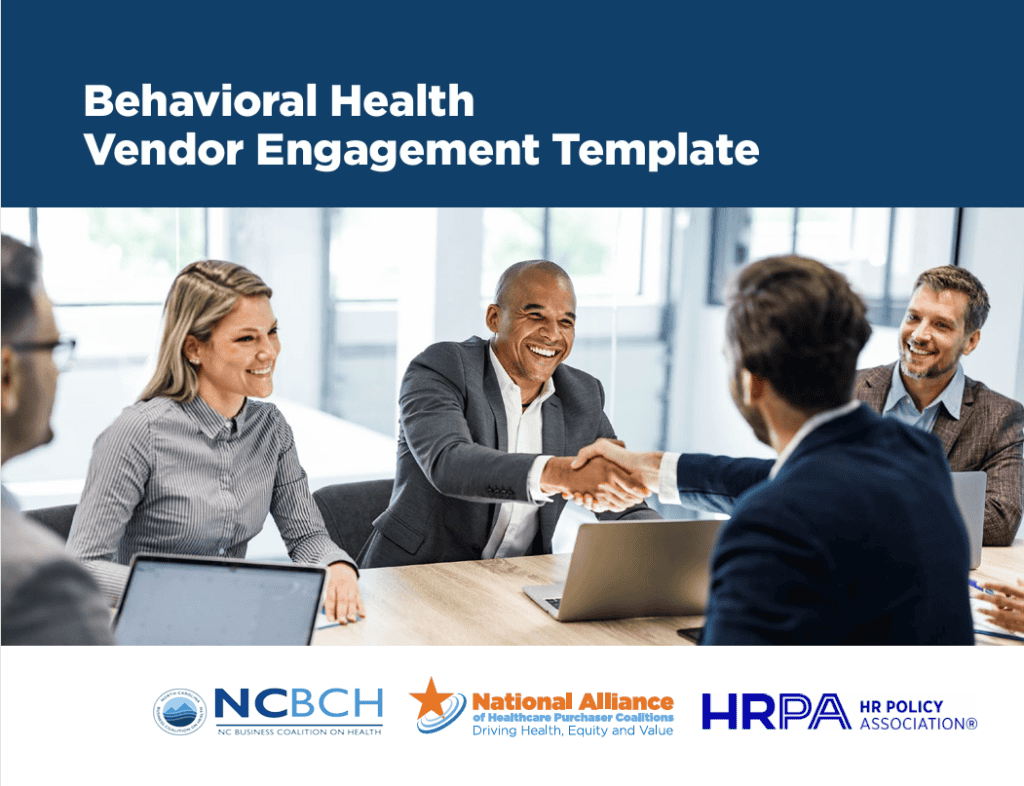
Behavioral Health Vendor Engagement Template
This Vendor Engagement Template (VET) is derivative of the development process of the Path Forward Mental Health Voice of the Purchaser survey and contains questions intended to supplement questions that might otherwise be included in ongoing vendor management discussions as well as in the vendor selection process. Employers and other plan sponsors are highly encouraged to integrate this tool into ongoing service provider performance assessment and performance improvement plans (or at least until any identified issues are effectively addressed).

Addressing Obesity through Holistic Design for Affordability and Sustainability
Obesity is a complex and multifaceted chronic disease, affecting more than 40% of the US population and linked to more than 220 conditions, including cardiovascular disease, Type II diabetes, and certain cancers. This provides the National Obesity Advisory Council Position Statement & Recommendations for Employers.

New Directions to Better Manage High-Cost Claims
High-cost claims have become the single fastest-growing healthcare cost for employers in the last decade. Since 2016, the number of health plan members with claims of $3 million or more has doubled, making these claims a significant threat to employer-sponsored healthcare. The elimination of annual and lifetime maximums through the Affordable Care Act has redefined what is possible.

Raising the Bar for High-Quality Mental Health
In a 2022 study by Gallup, nearly one-fifth of US workers (19%) rated their mental health as fair or poor; those workers reported about four times more unplanned absences due to poor mental health than their peers. Mental health issues in the US workforce cost the economy an estimated $185 billion annually in lost productivity and presenteeism. This Action Brief offers specific steps employers and other plan sponsors can take to raise the bar for high-quality mental healthcare to ensure a more equitable and responsive behavioral health system.

Prescription Drug Provisions in the Inflation Reduction Act of 2022
On August 16, 2022, President Biden signed into law the Inflation Reduction Act of 2022. This is an expansive piece of legislation and covers a very wide variety of policies. This Health Policy in Transit will briefly describe the provisions related to prescription drugs, specifically those that affect employer plan sponsors.

Supporting Employees with Cardiovascular Disease (CVD) through Aspirin Therapy
A recent study from the Patient-Centered Outcomes Research Institute (PCORI) reinforces the positive impact of aspirin, regardless of dose, in preventing heart attacks and strokes in people living with heart disease. This Action Brief equips employers with action steps to help employees with CVD make informed decisions about aspirin dosing.

Debunking COVID-19 Vaccine Myths
With the COVID-19 vaccine rollout in high gear, misinformation has flooded communication channels and led to widespread concern and vaccine hesitancy. Employers play a key role in debunking the abundant myths and reassuring employees and their families that deep research has proven the vaccines to be highly safe and effective.
Employer Guidebooks
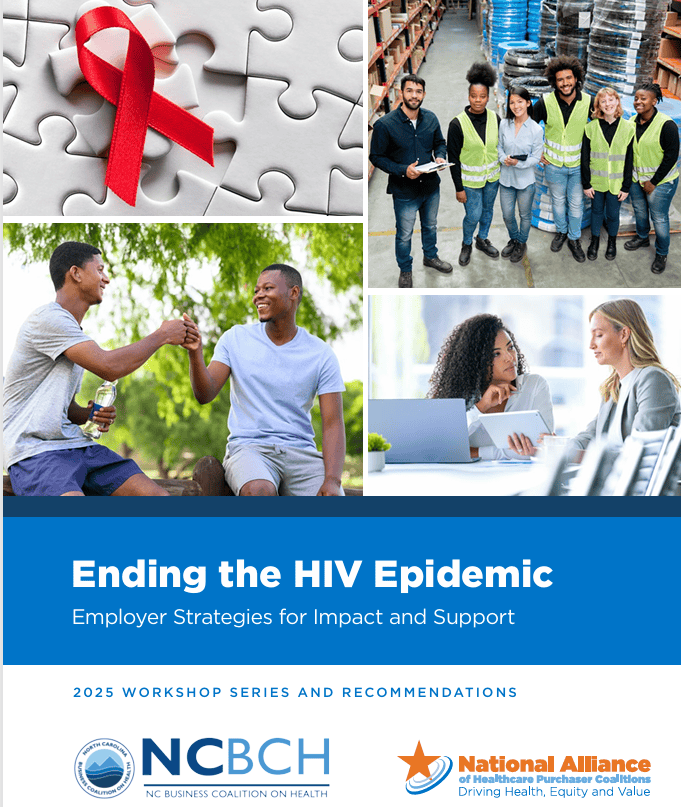
Ending the HIV Epidemic: Employer Strategies for Impact and Support
The National Alliance launched a four-part workshop series in 2025 to engage employer coalitions and human resources benefits leaders in accelerating progress toward ending America’s HIV epidemic. The workshops convened employers from four regional coalitions, equipping participants with knowledge, case studies, and action frameworks to improve access to HIV prevention and treatment through equitable benefit design and inclusive workplace practices. This resource highlights actionable steps employers can take to advance health equity and support people affected by HIV.
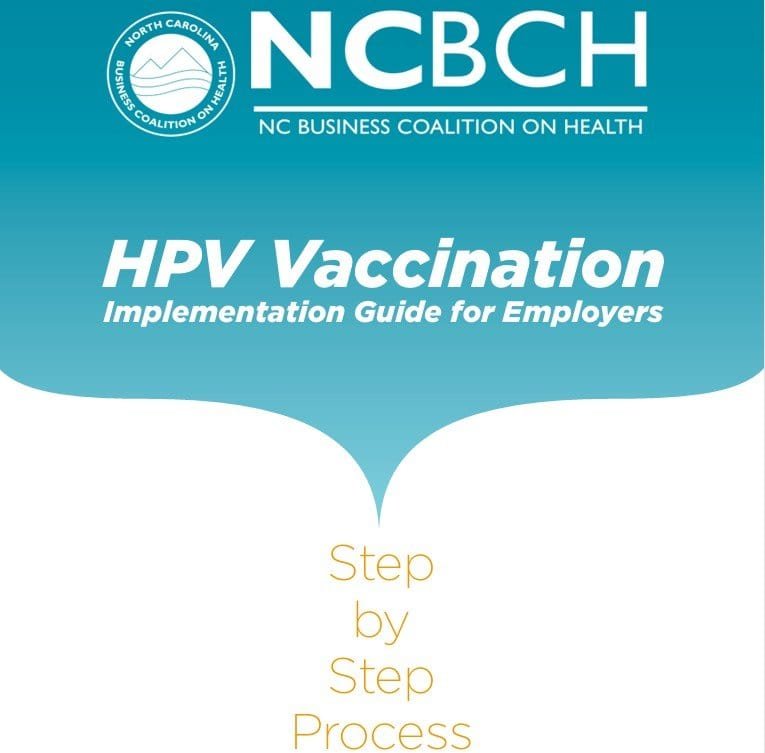
HPV Vaccination Implementation Guide for Employers
Almost every unvaccinated person who is sexually active will get HPV at some time in their life. About 13 million Americans, including teens, become infected with HPV each year. Most HPV infections will go away on their own. But infections that don’t go away can cause certain types of cancer including:
- Cervix, vagina, and vulva in women
- Penile in men
- Anus in both women and men
- Back of the throat (called oropharyngeal cancer), including the base of the tongue and tonsils, in both men and women
This guide for employers will help you create and implement an HPV Vaccine Campaign for your employees
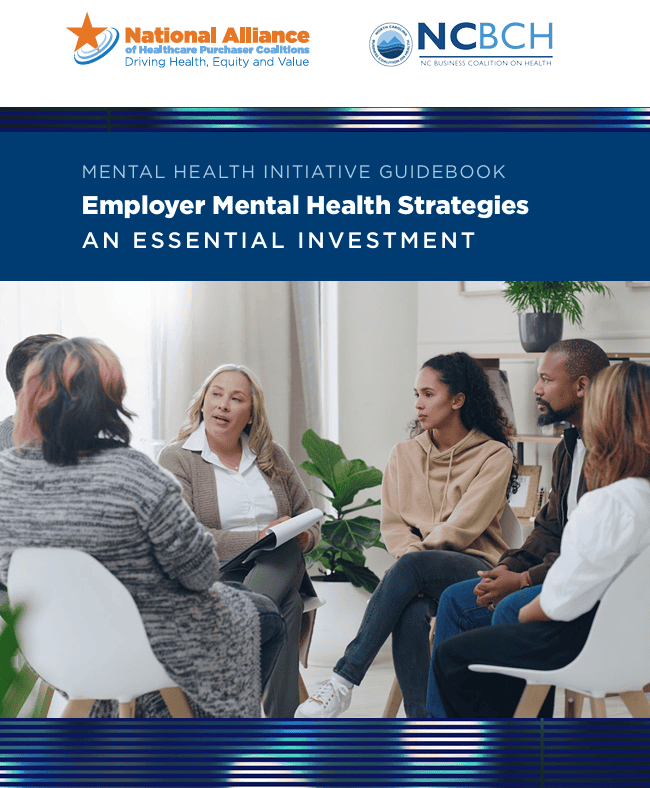
Employer Mental Health Strategies Guidbook
Building a comprehensive employer mental health strategy requires an impact-driven approach that incorporates insights from key stakeholders and coordinates the support of health plans, vendors, and employers in ways that are accessible and accountable. This guidebook discusses recommended steps for employers to develop or refine their approach to a mental health strategy.

Setting the Record Straight: The Urgency of Achieving Hospital Fair Price
Momentum at both the state and federal levels to make healthcare more transparent and affordable is growing. Efforts to achieve fair prices and transparency to lower the cost of healthcare that holds down wages and stalls business growth have been challenged every step of the way by hospitals. This resource identifies and debunks 10 of the top hospital industry inaccuracies around high, rapidly rising, and indefensible hospital prices.

Addressing Pharmacy Benefit Management Misalignment
High prescription drug costs continue to bankrupt families, put financial strain on businesses, and drag down the US economy and pharmacy benefit management plays a significant behind-the-scenes role. TO arm employers and other plan sponsors with a blueprint to understand and navigate PBM relationships and strengthen their negotiating and contracting capabilities, the National Alliance has developed this playbook for purchasers.

Employer Playbook on Biosimilars
Employers and other healthcare purchasers grapple with how best to integrate biologics into health and pharmacy benefit plans. The National Alliance has developed this playbook to provide clear information to inform conversations with health plans and other vendor partners.

Beyond Hospital Transparency – Getting to Fair Price
Hospital costs are one of the fastest-growing expenditures in the US economy, with employers and employees paying the highest prices in the world. This guidebook offers…
- An understanding of how to use the latest hospital price transparency tools.
- Insight into employer fiduciary rights and responsibilities.
- Actionable market- and policy-based strategies to drive value-based care

Behavioral Health Vendor Engagement Template
This Vendor Engagement Template (VET) supplements questions that may be included in ongoing mental health vendor management discussions. The goal is to help employers and other plan sponsors address issues of mental health access and quality, which are foundational to employer health strategy.

